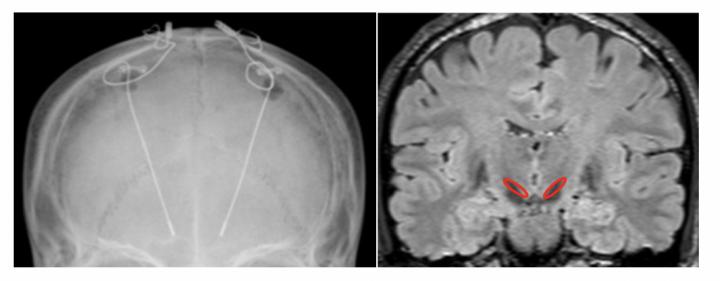Patients with Parkinson’s disease can voluntarily control β waves in their deep brain, representing a new approach toward managing disease-related brain activity

Credit: Osaka University
Parkinson’s disease is associated with abnormal beta wave activity in the subthalamic nucleus (STN), but a direct connection between this activity and movement difficulties has not yet been established.
A study group at Osaka University developed a neurofeedback system (Figure 1) which enables patients with Parkinson’s disease to voluntarily control beta wave activity in their deep brain (STN, Figure 2) associated with symptoms of the disorder. The group demonstrated that the patients can control these beta waves voluntary; however, it remains to be determined whether such a system can provide symptom relief. The group’s research results were published in eNeuro.
“In a study of eight patients undergoing a routine replacement of a pulse generator used for deep brain stimulation, we developed a method that could help scientists better understand the relationship between brain activity and disease symptoms,” says senior author Haruhiko Kishima.
In this study, the patients were trained to increase the size of a black circle that changes according to the participants’ real-time beta wave activity. For half of the participants, the size of the black circle was positively correlated with beta wave intensity, and for other half of the participants, the circle was negatively correlated with beta wave intensity. After the 10 minutes of training, the study demonstrated that the patients’ beta waves significantly increased or decreased depending on the circle condition. Using the real-time feedback system, the patients can voluntarily control their beta waves.
Corresponding author Takufumi Yanagisawa says, “Although we did not observe an improvement in patients’ symptoms, our study represents a new approach toward managing disease-related brain activity that could lead to the development of new treatments.”
###
The article, “Real-Time Neurofeedback to Modulate β-Band Power in the Subthalamic Nucleus in Parkinson’s Disease Patients” was published in eNeuro at DOI: https:/
About Osaka University
Osaka University was founded in 1931 as one of the seven imperial universities of Japan and now has expanded to one of Japan’s leading comprehensive universities. The University has now embarked on open research revolution from a position as Japan’s most innovative university and among the most innovative institutions in the world according to Reuters 2015 Top 100 Innovative Universities and the Nature Index Innovation 2017. The university’s ability to innovate from the stage of fundamental research through the creation of useful technology with economic impact stems from its broad disciplinary spectrum.
Website: https:/
Media Contact
Saori Obayashi
[email protected]
81-661-055-886
Original Source
https:/
Related Journal Article
http://dx.




